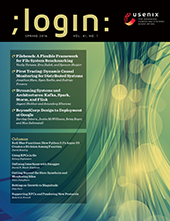USENIX supports diversity, equity, and inclusion and condemns hate and discrimination.
/dev/random
;login: Enters a New Phase of Its Evolution
For over 20 years, ;login: has been a print magazine with a digital version; in the two decades previous, it was USENIX’s newsletter, UNIX News. Since its inception 45 years ago, it has served as a medium through which the USENIX community learns about useful tools, research, and events from one another. Beginning in 2021, ;login: will no longer be the formally published print magazine as we’ve known it most recently, but rather reimagined as a digital publication with increased opportunities for interactivity among authors and readers.
Since USENIX became an open access publisher of papers in 2008, ;login: has remained our only content behind a membership paywall. In keeping with our commitment to open access, all ;login: content will be open to everyone when we make this change. However, only USENIX members at the sustainer level or higher, as well as student members, will have exclusive access to the interactivity options. Rik Farrow, the current editor of the magazine, will continue to provide leadership for the overall content offered in ;login:, which will be released via our website on a regular basis throughout the year.
As we plan to launch this new format, we are forming an editorial committee of volunteers from throughout the USENIX community to curate content, meaning that this will be a formally peer-reviewed publication. This new model will increase opportunities for the community to contribute to ;login: and engage with its content. In addition to written articles, we are open to other ideas of what you might want to experience.

Lest I give the impression of being some horrible Luddite for what I will say later in this column, let me tell you a story from the before times. Way back in the second half of the last decade of the twentieth century (because saying it that way takes more words than simply writing “the late 1990s,” and that means I have to come up with that much less actual content), I was involved in the Internet Engineering Task Force. I say “involved” but mostly what I did was join working groups and then sit in the back wishing I knew enough about whatever they were talking about to participate in some meaningful way. I was trying to be dutiful and read all of the drafts as they came out—or at least as many as I could without suffering debilitating brain damage. That got to be a little confusing and tedious after a while, so I decided to organize them a little better.

